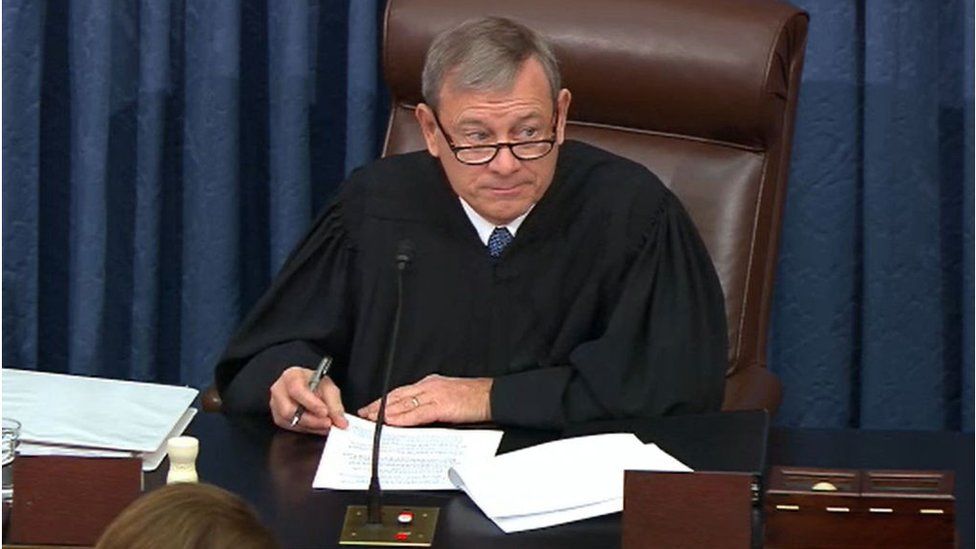Why is 'pettifogging' suddenly in the news?
- Published

On the first day of the Trump impeachment trial, Chief Justice of the Supreme Court John Roberts uttered the word "pettifogging" to illustrate a point. What does this archaic word mean and where did it come from?
The Chief Justice threw the rarely used term into proceedings to remind House of Representatives impeachment managers and the president's lawyers about the expected levels of decorum when arguing in the Senate.
"In the 1905 Swayne trial, a senator objected when one of the managers used the word 'pettifogging' and the presiding officer said the word ought not to have been used," Justice Roberts said.
"I don't think we need to aspire to that high of a standard, but I do think those addressing the Senate should remember where they are."
So what does it mean? To "pettifog" is, according to the Merriam-Webster dictionary, "to quibble over insignificant details" or "engage in legal chicanery".
The verb was actually formed from the noun "pettifogger", which was used in the 16th Century to describe those who would argue over minor details in a fee. Merriam-Webster also notes that the term was often used to describe "lower-status lawyers" who would take on small cases.
The word is so seldom used that Google Ngrams, which measures the frequency that words appear in books and journals, shows that "pettifogging" peaked in 1900, but has gradually disappeared.
While the word is certainly colourful, it eventually fell out of common parlance, other than in legal circles, according to lexicographer and Wall Street Journal language columnist Ben Zimmer.
"Vestiges of lexicon survive in the legal world and nowhere else," Mr Zimmer told the BBC. "Lawyers and judges are always appealing to precedent so often returning to older texts."
But judges are certainly capable of reviving particular words, Mr Zimmer explains.
"Justice [Antonin] Scalia was famous for this and notably brought back 'argle bargle'," he says. "When words pop-up in legal proceedings it often gives the public a chance to rediscover a word."
Four words that don't exist in English (yet)
Following Justice Roberts' use of the word this week, interest grew in its meaning and origins.
Merriam-Webster even reported that lookups for the word "pettifogger" spiked 30,800%. The eminent dictionary even took to Twitter to provide a definition for its followers who woke up to see the word was trending and may have been confused.
Allow Twitter content?
This article contains content provided by Twitter. We ask for your permission before anything is loaded, as they may be using cookies and other technologies. You may want to read Twitter’s cookie policy, external and privacy policy, external before accepting. To view this content choose ‘accept and continue’.
Allow Twitter content?
This article contains content provided by Twitter. We ask for your permission before anything is loaded, as they may be using cookies and other technologies. You may want to read Twitter’s cookie policy, external and privacy policy, external before accepting. To view this content choose ‘accept and continue’.
While the word may seem arcane, for the fans of the critically-acclaimed television show "Schitt's Creek", it seemed more familiar. Moira Rose, the family matriarch who is played by Catherine O'Hara, is regularly heard sprinkling her sentences with archaic words and phrases.
Allow Twitter content?
This article contains content provided by Twitter. We ask for your permission before anything is loaded, as they may be using cookies and other technologies. You may want to read Twitter’s cookie policy, external and privacy policy, external before accepting. To view this content choose ‘accept and continue’.
The show follows the once-wealthy Rose family as they are forced to settle in a rural town that they had bought as practical joke. Now, the town is their only remaining asset and they are forced to acclimatise.
O'Hara's performance has been praised widely, with many highlighting her stylised language and accent. Her work has also been rewarded with a Primetime Emmy nomination.
In an interview with Vulture this year, O'Hara explained how thrilled she was to include words, like "pettifogging", in her character's vocabulary (which also includes words like "frippet" and "confabulate").
The actress added that while filming her make-up artist gifted her a copy of "Foyle's Philavery: A Treasury of Unusual Words". O'Hara said she would study the book and often work her favourite words into her scripts.
After "pettifogging" began to pick up steam on Twitter, fans of "Schitt's Creek" didn't miss a beat to point out that Moira Rose had introduced them to the word long before it was heard on the Senate floor.
Allow Twitter content?
This article contains content provided by Twitter. We ask for your permission before anything is loaded, as they may be using cookies and other technologies. You may want to read Twitter’s cookie policy, external and privacy policy, external before accepting. To view this content choose ‘accept and continue’.
- Published15 September 2017
- Published1 February 2020
- Published30 September 2018